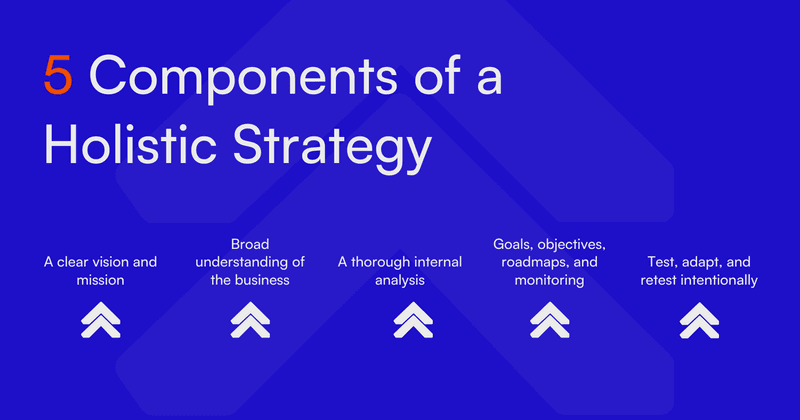Strategy That Keeps Pace with Change
Business moves fast. If you're a leader, you’ve likely felt the pressure of changing markets, customer expectations, and internal complexity. The real question is: Is your strategy built to adapt?
Too many companies rely on narrow strategies—focused only on growth targets, a product, or one function—without accounting for how the rest of the business needs to work together. The result? Misalignment, stalled execution, and missed opportunities.
What’s needed is a holistic strategy: one that considers the full system of your business—people, operations, technology, culture, and customer experience—to drive growth and resilience.
What Is a Holistic Strategy?
A holistic strategy is a connected approach to planning and execution. It doesn’t treat departments as separate or success as siloed. Instead, it ensures all areas of your business are aligned around a shared vision and can respond together to change.
It’s grounded in systems thinking: the idea that every part of your business impacts the whole. A change in operations may affect customer experience. A shift in leadership can influence culture. Holistic strategy maps these interdependencies and makes them work for you.
Why Traditional Strategy Falls Short
Linear or one-dimensional strategies often focus on a single goal—like launching a product or hitting sales targets—without considering organizational capacity, team alignment, or external forces. These strategies:
- Struggle to scale
- Create confusion or misaligned priorities
- Ignore cultural and people-driven dynamics
- React poorly to disruption
Example: A quick-service restaurant opened a second location using the same model that worked for its original site—without considering different customer demographics or hiring challenges. The result? Both locations underperformed due to an overstretched team and lack of strategic fit.
A holistic strategy would have flagged those gaps—and prepared the business for more sustainable growth.
The Five Building Blocks of a Holistic Strategy
- Clear Vision and Mission
A shared direction helps every team understand how their work supports long-term success. - Contextual Awareness
Deep understanding of your external environment—customers, competitors, markets, and trends. - Internal Readiness
Assess your culture, systems, leadership, and capabilities to align effort with opportunity. - Strategic Roadmap & Metrics
Set realistic goals, prioritize initiatives, and track progress across all critical functions. - Test, Adapt, Repeat
Strategy isn’t a one-time plan. It’s a working hypothesis that must evolve with your business.

The Role of Maturity in Strategy Execution
A mature organization has the ability to think systemically, act with agility, and learn from data. Maturity means:
- Seeing complexity clearly
- Making informed, cross-functional decisions
- Resisting short-term reactions in favor of long-term impact
- Building resilience through structured growth
This maturity doesn’t happen by chance—it’s built through deliberate planning and constant improvement.
The Holistic Maturity Model™: A Framework for Strategic Growth
To help leaders assess where their organization stands—and what it needs to grow—NWC created the Holistic Maturity Model™.
This model evaluates maturity across three core dimensions:
- Culture – leadership, engagement, and shared purpose
- Capability – skills, systems, and execution power
- Continuity – adaptability, resilience, and sustainability
Each area is broken into practical attributes you can measure, improve, and align across your business.
The result: a tailored roadmap to build strategic maturity, close capability gaps, and drive growth from the inside out.
Why This Matters Now
In a volatile, fast-moving environment, holistic strategy isn’t optional—it’s essential.
It helps leaders:
- Connect vision with execution
- Break silos and unify the business
- Make better, faster decisions
- Turn complexity into competitive advantage
If you want your organization to grow with intention—and stay strong through change—now is the time to take a holistic approach to strategy.
Ready to assess your organization’s strategic maturity?
Explore the Holistic Maturity Model™ at novelwork.co/holistic-maturity-model or contact us at do@novelwork.co.





.png)
.png)